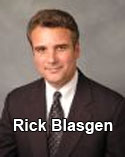Gilmore: It was interesting - a CSCMP conference key note speaker, Fran Townsend, mentioned all the other factors that had to be considered in sourcing decisions besides the usual cost elements.
Blasgen: Cultural issues, geopolitical issues, things in the economy that affect the marketplace and, therefore, your supply chain’s performance. What happens if there is a supplier in a particular country that all of a sudden becomes an enemy of this country or some other country, right away your supplier base is dried up and you need another one in another friendly place. All of those things supply chain people have to deal with today, they either didn’t have to deal with 20 years ago, or did so on a much lesser scale.
Gilmore: Back to the talent issue, there are a few companies, like The Limited Brands, P&G, Wal-Mart, PepsiCo-Frito-Lay, and some others, that are known for talent development. But it seems to me there are fewer of these lately, and everyone else is just relying on hiring talent that someone else developed. But those minor leagues will run dry if everyone takes that approach, won’t they?
 Blasgen: That’s right. It’s a good problem in so far as the opportunities for supply chain professionals are just as good in tougher economic times now as they are when we have great times, and that is always going to be the case. Blasgen: That’s right. It’s a good problem in so far as the opportunities for supply chain professionals are just as good in tougher economic times now as they are when we have great times, and that is always going to be the case.
I always tell people - look at your career as a marathon, not a sprint. Go get the managerial, technical, leadership skills to be a leader down the road. And interpersonal skills are becoming more and more important because you have to deal with those not only up and down the supply chain certainly, but inside your company from the CEO down to the people working on the warehouse floor.
Then you have to deal horizontally amongst supply chain partners who might be halfway across the world. So, the interpersonal skills as person has is paramount to their success.
Gilmore: We’re in some challenging economic times right now, of course, but even before that, over the past several years, I’ve talked to a number of supply chain execs and managers who seem beaten down by the relentless pressure to reduce costs, to meet Wall Street expectations, etc. It’s taken the enjoyment out of the job. Is there any antidote to that, based on your business experience?
Blasgen: I think part of the antidote, if you look back in history when we have had tough periods like this, is becoming innovative. It’s my opinion that when logisticians and supply chain professionals became innovative it was because we had to cut costs. So, somehow we found a way to do something better within the process, or create technology or another business process that got us much more effective and efficient. And it’s tough because during that time you are also committing to high customer service levels and meeting a budget inside your company and so on. So, while you are trying to create the future to work yourself out of the turbulent time you are in, you are also serving.
Innovating should be fun work.
It’s tough out there, but I think over time, history tells us logistics people – that this is where some of the great innovations have come from, and we have come a long way with things like RFID, and implementations of unique systems now where you can collaborate across the continent in a moment’s notice. These are exciting.
We’ve got to harness that and the idea about collaborating – we have talked about it and researched it, but people are actually doing it. It’s tough out there in the supply chain, but there are a lot of other functions that are having a tough time too.
Gilmore: In the past during your career, I’ve heard you speak about aligning supply chain with the brand or business needs. How can supply chain add value beyond just reducing costs?
Blasgen: Well, it certainly can and should. Look at the price of oil. I remember if it moved 2% in a day, it was a big deal. Today, it can move 5 dollars one way one hour and 5 dollars the other way in a different hour in the same day.
Just trying to understand that and the implications of it is fruitless – you just have to deal with it. So, I think there has been step change, a threshold change in cost structure, and that is born out by our State of Logistics report. So, helping your company become more nimble and flexible is critical. Yes, that’s a lot about cost too, but in a different way.
From that, I think will also come innovation. At the executive panel at our conference, those participants talked about this a lot. They said you can either have a pity party about all these challenges, or you can be optimistic about it and think about these challenges becoming next year’s innovation.
 Gilmore: Where is CSCMP going to go over the next 5 years or so? Gilmore: Where is CSCMP going to go over the next 5 years or so?
Blasgen: I think we have to continue to focus on innovation. We have to push the envelope in terms of research, but ensure that we are connected to practitioner’s needs and that we are investigating the right topics.
We are going to continue to provide world-class research and disseminate that a number of different ways. I can see the day where we will engage with companies much differently than we do today. Today, we cast our net far and wide and try to get individual memberships.
We will continue to do that, but we should also have an alliance with companies to allow them to tell us what are their needs and objectives. We can come to them with a strategy that says CSCMP offers things like a career center, on-line education, on-site education. We offer all these periodicals and deep dives into topics and even individual countries.
What is it that you need? Do you have companies/employees worldwide? We have capabilities and partners worldwide. And we will have a relationship with you and you can participate with us on a global basis, a little bit different than just the individual type membership.
I can see organizations like ours having an office or presence in different countries so people can come to us locally and get what they need.
For now, we are fine managing the way we do, but I think there is going to be some local operational activity that will still occur because countries and business will need that. But then if I want to know how to create a global supply chain, where will I go to get that knowledge. I think that is something we have a responsibility for, to educate and give others a venue by which they can gather that information.
What’s your take on our interview with CSCMP’s Rick Blasgen? What types of services do you think CSCMP or similar organizations should provide? Are they doing those things well now? Let us know your thoughts at the Feedback button below. |